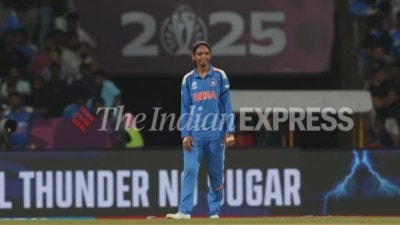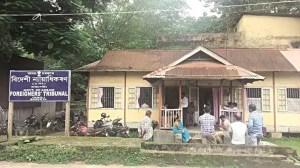JNU results show NSUI continues to shrink, leaders say students flocked behind Left to keep out ABVP
Student leaders say NSUI performance across Hindi heartland universities tied to Cong fortunes. As the parent body faltered nationally over the past decade, so did NSUI's success rate
 Student elections were held after a gap in JNU, like in most other universities, where the annual exercise was disrupted by the Covid-19 pandemic. (Source: X)
Student elections were held after a gap in JNU, like in most other universities, where the annual exercise was disrupted by the Covid-19 pandemic. (Source: X)
When the results of the Jawaharlal Nehru University Students’ Union (JNUSU) were announced on Sunday, the vote count of the presidential candidate of the Congress’s student wing National Students’ Union of India (NSUI) stood at 283 out of 5,656 votes polled or 5%, a sharp drop from the 700 out of 5,050 votes it had received in 2019, or 13.86% of the total, the last time elections were held at India’s premier university.
Days later, as the organisation’s bigwigs tried to make sense of the debacle — in which the Left Unity coalition came first, followed by the RSS student body ABVP and the much-newer Birsa Ambedkar Phule Students’ Association — two reasons were cited: polarisation on the campus, and the desire of a large number of students “to make a statement about how to defeat the BJP in the upcoming Lok Sabha elections”.
As per the NSUI leaders, a majority of the students, most of whom are against the ABVP, felt they could trust the Left Unity alliance — comprising the CPI(M) student wing Students Federation of India (SFI), the SFI breakaway Democratic Students Federation (DSF), the CPI(ML-Liberation)’s All India Students Association (AISA) and the CPI’s All India Students’ Federation (AISF) — more than the NSUI to stop the ABVP.
Student elections were held after a gap in JNU, like in most other universities, where the annual exercise was disrupted by the Covid-19 pandemic.
Unlike Delhi University (DU), JNU has never been a stronghold of the NSUI. Nevertheless, between 2012 and 2014 — when the Congress-led UPA was at helm in the Centre — it was seen as an alternative to the predominantly Leftist politics on the campus. However, things changed rapidly after the BJP swept to power in the 2014 Lok Sabha polls, and “polarisation between the Left and the Right” started to make the centrist NSUI “redundant”, its leaders said.
The NSUI, which has been losing vote share to the ABVP in JNU since 2013, had fielded candidates for two of the four central panel posts in the JNUSU this year — Junaid Raza and Fareen Zaidi, for president and general secretary, respectively. While Raza got 283 votes, Zaidi fared slightly better with 436 votes.
Speaking to The Indian Express, NSUI media convenor Zeeshan Ahmad Khan said, “The Left has had a stronghold in JNU for several years. But the only reason many students voted for them this year is to make sure that the ABVP doesn’t win. The JNUSU results are also a strong political statement nationally to the BJP that students are against the ideology of hate and communal disharmony.”
However, there is a silver lining for the NSUI. Compared to the three councillors it had won in 2019, this year it won four, out of the 10 it had fielded. “This year, our vote share in the councillor polls rose. One of our candidates won in the School of Languages — the largest school on the campus,” said Sudhanshu Shekhar, the president of JNU’s NSUI unit.
About the gains for the BAPSA, Shekhar said: “It too fared better than the NSUI as the Left supported its general secretary candidate after their own candidate’s nomination was cancelled. There was a sense of panic on the campus not to let the ABVP win.”
He added that today, the ABVP is where the NSUI used to be when the Congress was in power at the Centre, with the Left historically dominating the JNUSU polls.
Across town, the NSUI has a stronger foothold in DU. It won the post of DUSU president in 2011, 2012 and 2017, and has been in the running for all four central posts every year for over a decade.
However, even in DU, the ABVP has been increasing its footprint, with its vote share in contests across the four DUSU central posts rising from 30.13% in 2020 to 33.04% in 2023. Interestingly, the NSUI held on to its vote share — around 29.04%, while its Abhi Dahiya bagged the vice-president’s post, thus retaining the 1:3 ratio in the DUSU central panel vis-a-vis the ABVP.
In the Hindi heartland, the NSUI got good news from the Allahabad University students’ union election last year, when it won the vice-president’s post there. It also continues to hold significant influence in Rajasthan University.
In the 2022 Rajasthan University Student Union (RUSU) elections, which took place after a gap of two years, Independents Nirmal Choudhary and Niharika Jorwal came first and second, with the NSUI’s Ritu Barala coming third. However, this doesn’t paint the complete picture as Jorwal is a NSUI rebel. The ABVP’s Narendra Yadav came a distant fourth.
- 01
- 02
- 03
- 04
- 05































